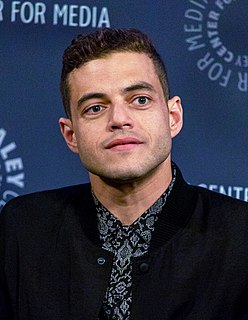
The Academy Awards, more popularly known as the Oscars, are awards for artistic and technical merit in the film industry. Given annually by the Academy of Motion Picture Arts and Sciences (AMPAS), the awards are an international recognition of excellence in cinematic achievements as assessed by the Academy's voting membership. The various category winners are awarded a copy of a golden statuette, officially called the "Academy Award of Merit", although more commonly referred to by its nickname "Oscar". The statuette depicts a knight rendered in Art Deco style.
The Academy Award for Best Picture is one of the Academy Awards (“Oscars”) presented annually by the Academy of Motion Picture Arts and Sciences (AMPAS) since the awards debuted in 1929. This award goes to the producers of the film and is the only category in which every member of the Academy is eligible to submit a nomination and vote on the final ballot. Best Picture is the final award of the night and is considered the most prestigious honor of the ceremony.
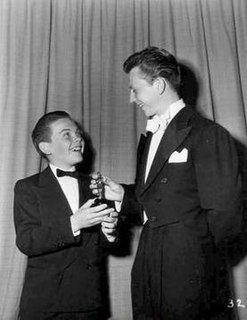
The Academy Juvenile Award, also known informally as the Juvenile Oscar, was a Special Honorary Academy Award bestowed at the discretion of the Board of Governors of the Academy of Motion Picture Arts and Sciences (AMPAS) to specifically recognize juvenile performers under the age of eighteen for their "outstanding contributions to screen entertainment".
The British Academy of Film and Television Arts or BAFTA Film Awards are presented in an annual award show hosted by the British Academy of Film and Television Arts (BAFTA) to honour the best British and international contributions to film. The ceremonies were initially held at the flagship Odeon cinema in Leicester Square in London, before being held at the Royal Opera House from 2008 to 2016. Since 2017, the ceremony has been held at the Royal Albert Hall in London.
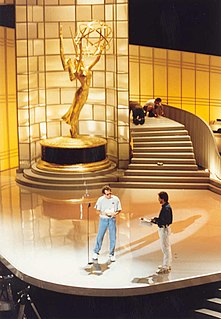
An Emmy Award, or simply Emmy, is an American award that recognizes excellence in the television industry. It is presented at numerous annual events held throughout the calendar year, each honoring one of the various sectors of the television industry. The two ceremonies that receive the most media coverage are the Primetime Emmy Awards and the Daytime Emmy Awards, which recognize outstanding work in American primetime and daytime entertainment programming, respectively. Other notable Emmy events include those honoring national sports programming, national news and documentary shows, and technological and engineering achievements in television, including the Primetime Engineering Emmy Awards. Regional Emmy Awards are also presented throughout the country at various times through the year, recognizing excellence in local and statewide television. In addition, the International Emmy Awards honor excellence in TV programming produced and initially aired outside the United States.

The Academy of Country Music(ACM) was founded in 1964 in Los Angeles, California as the Country & Western Music Academy. Among the founders were Eddie Miller, Tommy Wiggins, and Mickey and Chris Christensen. They wanted to promote country music in the western 13 states with the support of artists based on the West Coast. Artists such as Johnny Bond, Glen Campbell, Merle Haggard, Roger Miller and others influenced them. A board of directors was formed to govern the academy in 1965.

The 74th Academy Awards ceremony, presented by the Academy of Motion Picture Arts and Sciences (AMPAS), took place on March 24, 2002, at the Kodak Theatre in Hollywood, Los Angeles. During the ceremony, AMPAS presented Academy Awards in 24 categories honoring films released in 2001. The ceremony, televised in the United States by ABC, was produced by Laura Ziskin and directed by Louis J. Horvitz. Actress Whoopi Goldberg hosted the show for the fourth time. She first hosted the 66th ceremony held in 1994 and had last hosted the 71st ceremony in 1999. Three weeks earlier, in a ceremony held at the Regent Beverly Wilshire Hotel in Beverly Hills, California, on March 2, the Academy Awards for Technical Achievement were presented by host Charlize Theron.

The 1st Academy Awards ceremony, presented by the Academy of Motion Picture Arts and Sciences (AMPAS), honored the best films of 1927 and 1928 and took place on May 16, 1929, at a private dinner held at the Hollywood Roosevelt Hotel in Los Angeles, California. AMPAS president Douglas Fairbanks hosted the show. Tickets cost $5, 270 people attended the event and the presentation ceremony lasted 15 minutes. Awards were created by Louis B. Mayer, founder of Louis B. Mayer Pictures Corporation. It is the only Academy Awards ceremony not to be broadcast either on radio or television. The radio broadcast was introduced the following year in 1930.
The 2nd Academy Awards ceremony, presented by the Academy of Motion Picture Arts and Sciences (AMPAS), honored the best films released between August 1, 1928, and July 31, 1929. They took place on April 3, 1930, at an awards banquet in the Cocoanut Grove of the Ambassador Hotel in Los Angeles.
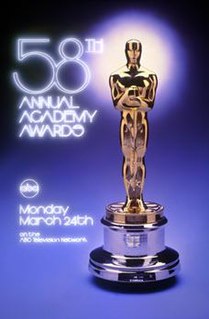
The 58th Academy Awards ceremony, organized by the Academy of Motion Picture Arts and Sciences (AMPAS), took place on March 24, 1986, at the Dorothy Chandler Pavilion in Los Angeles beginning at 6:00 p.m. PST / 9:00 p.m. EST. During the ceremony, AMPAS presented Academy Awards in 23 categories honoring films released in 1985. The ceremony, televised in the United States by ABC, was produced by Stanley Donen and directed by Marty Pasetta. Actors Alan Alda, Jane Fonda, and Robin Williams co-hosted the show. Fonda hosted the gala for the second time, having previously been a co-host of the 49th ceremony held in 1977. Meanwhile, this was Alda and Williams's first Oscars hosting stint. Eight days earlier, in a ceremony held at The Beverly Hilton in Beverly Hills, California, on March 16, the Academy Awards for Technical Achievement were presented by host Macdonald Carey.

The 43rd Academy Awards ceremony, presented by Academy of Motion Picture Arts and Sciences, was held on April 15, 1971, and took place at the Dorothy Chandler Pavilion to honor the best films of 1970. The Awards presentation, hosting duties were handled by 34 "Friends of Oscar" and broadcast by NBC for the first time in 11 years.

The 46th Academy Awards were presented on Tuesday, April 2, 1974, at the Dorothy Chandler Pavilion in Los Angeles, California. The ceremonies were presided over by Burt Reynolds, Diana Ross, John Huston, and David Niven.
Owen Roizman, ASC is an American cinematographer. He has received five Academy Award nominations for Best Cinematography, for the films The French Connection (1971), The Exorcist (1973), Network (1976), Tootsie (1982), and Wyatt Earp (1994). He served on the Board of Governors of the Academy of Motion Picture Arts and Sciences and was president of the American Society of Cinematographers.
The 15th Academy Awards was held in the Cocoanut Grove at The Ambassador Hotel in Los Angeles honoring the films of 1942. Best Picture honors went to the film Mrs. Miniver. The ceremony is most famous for the speech by the film’s Oscar-winning actress Greer Garson. Garson’s acceptance speech as Best Actress ran nearly 6 minutes and is generally considered to be the longest acceptance speech at an Academy Awards ceremony.
1969 Academy Awards may refer to:

The 8th Hong Kong Awards ceremony, honored the best films of 1988 and took place on 9 April 1989 at Hong Kong Academy for Performing Arts, Wan Chai, Hong Kong. The ceremony was hosted by Lydia Shum, Eric Tsang and Philip Chan, during the ceremony awards are presented in 14 categories. The ceremony was sponsored by City Entertainment Magazine.
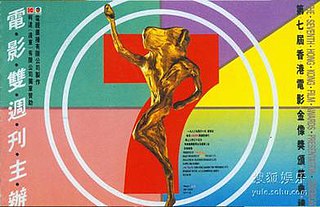
The 7th Hong Kong Awards ceremony, honored the best films of 1987 and took place on 10 April 1988 at Hong Kong Academy for Performing Arts, Wan Chai, Hong Kong. The ceremony was hosted by Lydia Shum and Paul Chung, during the ceremony awards are presented in 14 categories. The ceremony was sponsored by City Entertainment Magazine.

The 91st Academy Awards ceremony, presented by the Academy of Motion Picture Arts and Sciences (AMPAS), honored the best films of 2018, and took place at the Dolby Theatre in Hollywood, Los Angeles, California. The ceremony was held on February 24, 2019. During the ceremony, AMPAS presented Academy Awards in 24 categories. The ceremony was televised in the United States by the American Broadcasting Company (ABC), produced by Donna Gigliotti and Glenn Weiss, with Weiss also serving as director. It was the first ceremony in three decades, since the 61st Academy Awards in 1989, to be conducted with no host.
The 92nd Academy Awards ceremony, presented by the Academy of Motion Picture Arts and Sciences (AMPAS), will honor the best films of 2019 and will take place at the Dolby Theatre in Hollywood, Los Angeles, California. After more than a decade of previously holding the Academy Award ceremonies in at least late February, the 92nd Academy Awards will be held earlier on February 9, 2020. During the ceremony, AMPAS will present Academy Awards in 24 categories. The ceremony will be televised in the United States by ABC, produced by Lynette Howell Taylor and Stephanie Allain.











